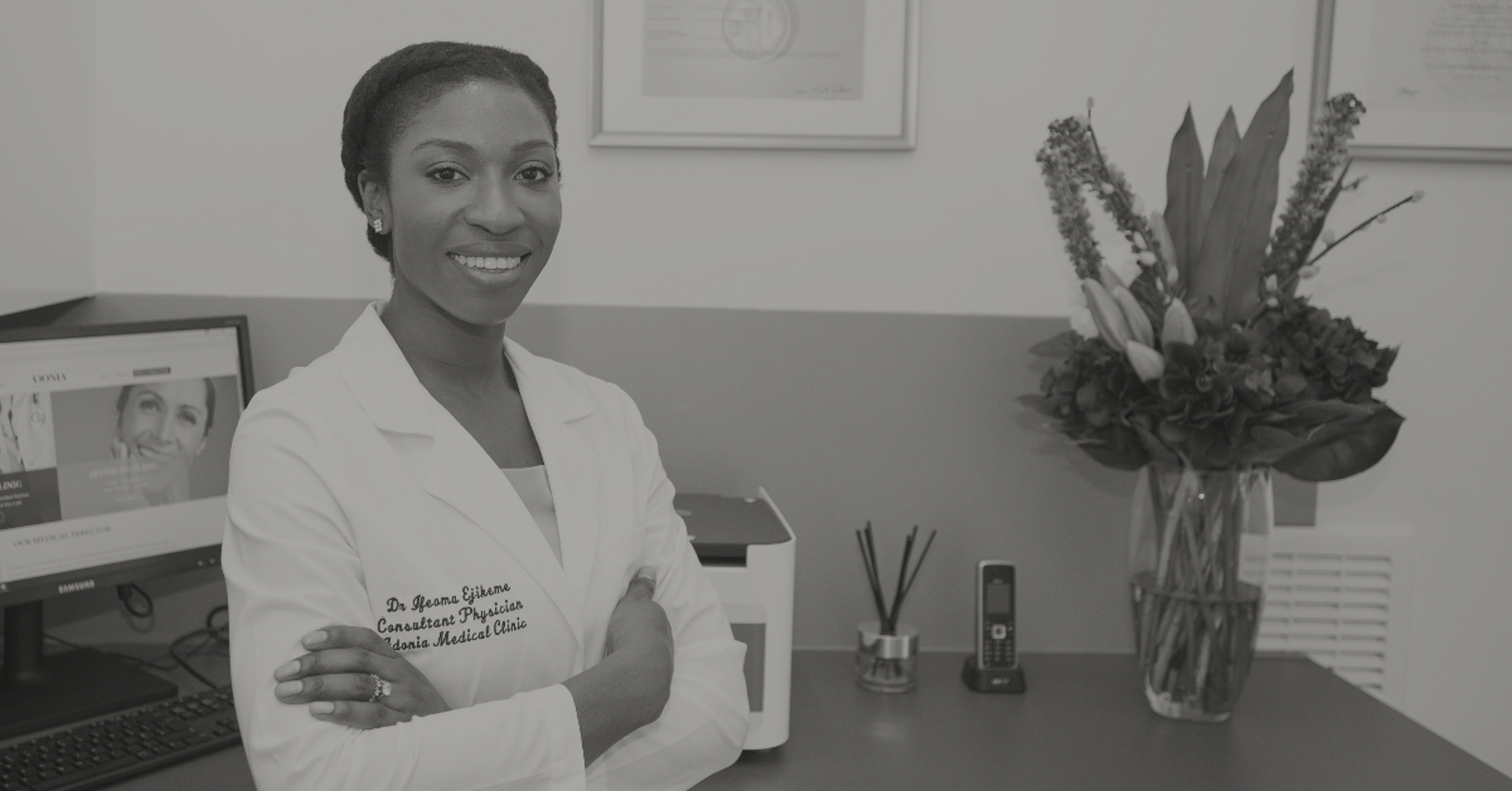First up in our Diversity in Aesthetics series, I had the pleasure of chatting to the wonderful Dr Ifeoma Ejikeme, owner of Adonia Medical Clinic, Board Certified Medical Consultant, and co-founder of the Black Aesthetics Advisory Board (BAAB). She shared the moment she knew aesthetics was for her, her beliefs on what can be done to make the aesthetics industry more diverse, and her hopes for the future of the industry.
Hi Dr Ejikeme. You have an incredible resume! How did you know medical aesthetics was the career for you, and did anyone help pave the way for you?
My passion for aesthetics started while I was studying in the USA. I spent some time with an amazing Rhinologist in 2008, and at that time, no one was injecting dermal fillers into the nose. He had a practice where I expected to see lots of rhinoplasty, but, actually, he was doing really advanced techniques with dermal filler. At that point, my interest switched from head and neck surgery to non-surgical aesthetics.
That was the point I realised there was something quite special about aesthetic medicine and the types of results you can get without surgery. I couldn’t see anybody else doing it at that time, and loved the fact that it was incredible yet so unique.
It’s apparent that the those in the industry are predominantly white, middle-class, men and women. From training materials to clinic websites to product advertising materials, they typically show very little diversity. Do you feel the lack of representation was a barrier to you and other black practitioners entering the industry?
There is definitely a lack of representation in aesthetics. This is evident in the products, the devices, and in the conferences, the speakers and the content of the talks. Quite often they will only focus on treatments and products for caucasion skin, which creates biases that certain treatments are either not appropriate for, or wanted by, BAME individuals.
If you treat all skin types, it means you have to have paid special attention to black and Asian skin, because it’s not part of the standard we have right now.
No matter what barrier you might come across, if you’re ambitious, you’ll try to find ways around it. I have come across barriers - some of them subtle and some overt - but I’ve managed to carve a niche out for myself. Part of the reason I started my own clinic was that if you can’t progress in an organisation, the next step is to try and do it yourself. If you’re not encouraged to speak, set up an Instagram account and speak to people who want to listen to you.
There are so many barriers in life - being female, being black, being young-looking - but you just have to keep going. No matter what barriers are put in front of you, you’ll find a way around them.
Can you tell me about an occasion where you have experienced racism in the industry?
In the UK, racism seems to be more covert than overt. It’s much more subtle, like not including someone when they have over and above all the degrees and credentials required, or telling them that they are not quite right or don’t quite fit the mould - even suggesting they change their name because you can’t be bothered to pronounce it if it’s a bit different.
Each of these things individually are not such a big deal, but when they happen continually, I think they can really affect certain people. I try not to focus on it, but it shouldn’t really be happening at all.
You spoke there about using social media to get your voice heard. Who are your top social media follows?
I like to flood my feed with positivity. Social media can be a minefield so, when I’m on there, I like to focus on the things that are empowering. I follow a lot of motivational speakers - people like Jamie Kern Lima and Oprah - and I like to learn from extraordinary people who have done incredible things. I try to keep my social media educational and be observant through it.
Literature regarding aesthetic treatments for different ethnicities doesn’t appear to exist. Is this because caucasian clients and black clients are treated in exactly the same way, with the same volumes, techniques and procedures, or because it just isn’t taught and documented? If it's the latter, what would you like to see done about this?
I think there are 3 main things that need to be addressed if we want more diversity in aesthetics. Firstly, aesthetic practitioners should be educated in identifying conditions in black skin, and there should be effective protocol in place for treating people of colour with safe treatments and products. There are lots of products that are currently used on black skin with little evidence to say that they work, or should even be used. But, there are certain products that work really well. Every practitioner should know which ones to use and which ones not to use.
Secondly, there should be greater public education. We should all be making a greater effort to explain to the public which treatments are available and which are suitable for different skin tones. There are a lot of misconceptions out there. For example, a lot of people ask me questions on my social media, such as “Should I have a chemical peel or will it burn my skin?” I notice that a lot more caucasian people use aesthetics terminology when it comes to the treatments they want, because they see themselves represented more on social media.
Finally, we should be seeing more before and after images of treatments on different skin types in the press. When I open up a magazine discussing aesthetics, I should be seeing a range of skin tones and information about what works best for each. BAME people should be represented more.
When you undertook training to become an aesthetic practitioner, did you feel adequately prepared to treat black skin and facial anatomy confidently, or did you have to self-teach?
I made it my business throughout my training to seek out case studies. For example, I went to the Bahamas, where there are people of Asian descent, people of Latino descent, as well as African descent, so I knew I would be treating a wide range of skin tones. I then went to Harvard before going to Spain and Colombia. I picked areas where I knew I would have a huge breadth of experience and I could delve deeper.
When I was training, I wanted to see what treatments looked like on black skin and I knew that I would need to do additional training. Other people shouldn’t have to do what I did; it should be part of aesthetics training.
Given the lack of representation within the industry, do black people - women in particular - see aesthetic treatments as being "for them"? If not, what can be done to address this?
There are a lot of black men and women who want to have good treatments and are trying to find a practitioner who feels confident in treating black skin. People don’t realise just how much black and Asian people want these treatments - just as much as their caucasian counterparts.
What are the top 5 treatments black clients request?
The top 5 things that black people tend to ask for in my clinic (not in any particular order) are treatment of hyperpigmentation of the face and body, acne management for the face and body, skin tightening/ stretch mark treatment, weight management treatments such as CoolSculpt, and dermal fillers.
What are your ambitions for your clinic and career in the next year?
There’s a lot that I want to do. The clinic is expanding quickly, which is great. I’m looking to bring in new technology that can help all different skin types, because I want it to be beneficial for all my patients. We’re bringing in new body contouring technology this year, which is really exciting.
What overall changes do you want to see within the aesthetics industry?
I would love for us to be able to celebrate all different skin types. I truly believe that when we treat every skin type well, everybody benefits - and I see proof of that in my practice. For example, by having treatments that treat skin type six pigmentation really well, means that I can treat skin types one and two pigmentation even better. If we all had that mindset with every treatment we offered, we would really see the industry grow.
I’d also love for aesthetic medicine to be recognised as its own individual specialty and regulated as such. That would be a great step for patients and practitioners in the industry.
Thanks so much for joining us, Dr Ejikeme.
You can follow Dr Ifeoma Ejikeme on Instagram - @dr_ifeoma_ejikeme

